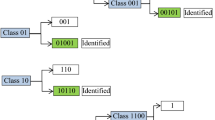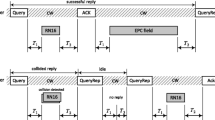Abstract
The replenishment of resource management problem is tough and necessary in RFID system, which requires tags to report the existing information uninterruptedly for guaranteeing goods supply. However, the random or synchronous reply may lead to collision, further, make the system low efficiency. Based on the fusion method between orthogonal code compiling category ID and analogy principle, we present the collision tolerance protocol UACP to identify tags efficiently, which contains UCOM and ACAM mechanisms. UCOM relies on orthogonal signals’ correlation to realize the tolerance and accurate category identification by making a comparison between the collision and the whole elements. ACAM depends on the analogy principle to estimate the existing number from microcosmic to macrocosmic only using the singleton slots, and the tags can transmit one-bit affirming message after a series of ACK commands. UACP also analyses some factors, such as the permutation and combination of multiple sets orthogonal codes, asynchronous code offset, signal missing rate, signal misjudgment probability, and shows the advantages on slot utilization rate, identification rate and time efficiency compared with other algorithms. After adopting BPSK modulation and USRP platform, UACP is verified the time-efficiency increasing of 25–60%.












Similar content being viewed by others
References
Fox, S., Rosner, D. K., Morris, M. E., & Kitner, K. R. (2015). Inviting participation through IoT: Experiments and performances in public spaces. Aarhus Series on Human Centered Computing, 1(1), 3.
Leung, J., Cheung, W., & Chu, S.-C. (2014). Aligning RFID applications with supply chain strategies. Information and Management, 51(2), 260–269.
Yang, L., Chen, Y., Li, X.-Y., Xiao, C., Li, M., & Liu, Y. (2014) Tagoram: Real-time tracking of mobile RFID tags to high precision using COTS devices. In Proceedings of the 20th annual international conference on mobile computing and networking (pp. 237–248). ACM.
Liu, J., Xiao, B., Bu, K., & Chen, L. (2014). Efficient distributed query processing in large RFID-enabled supply chains. In INFOCOM, 2014 Proceedings IEEE (pp. 163–171). IEEE.
De Donno, D., Tarricone, L., Catarinucci, L., Lakafosis, V., & Tentzeris, M. M. (2012). Performance enhancement of the RFID epc gen2 protocol by exploiting collision recovery. Progress in Electromagnetics Research B, 43, 53–72.
He, Y., & Wang, X. (2013). An aloha-based improved anti-collision algorithm for RFID systems. In IEEE, Wireless Communications (pp. 152–158.). IEEE.
Bagheri, N., Alenaby, P., & Safkhani, M. (2015). A new anti-collision protocol based on information of collided tags in RFID systems. International Journal of Communication Systems, 30(3), e2975. doi:10.1002/dac.2975.
Xiao, Q., Bu, K., & Xiao, B. (2011) Efficient monitoring of dynamic tag populations in RFID systems. In 2011 IFIP 9th international conference on embedded and ubiquitous computing (EUC) (pp. 106–113). IEEE.
Yin, Y., Xie, L., Wu, J., Vasilakos, A. V., & Lu, S. (2013). Focus and shoot: Efficient identification over RFID tags in the specified area. In International conference on mobile and ubiquitous systems: Computing, networking, and services (pp. 344–357). Springer.
Zheng, Y., & Li, M. (2013). P-mti: Physical-layer missing tag identification via compressive sensing. In INFOCOM, 2013 proceedings IEEE (pp. 917–925). IEEE.
Wang, J., Hassanieh, H., Katabi, D., & Indyk, P. (2012). Efficient and reliable low-power backscatter networks. In Proceedings of the ACM SIGCOMM 2012 conference on Applications, technologies, architectures, and protocols for computer communication (pp. 61–72). ACM.
Mota, R. P. B., & Batista, D. M. (2014). A dynamic frame slotted aloha anti-collision algorithm for the internet of things. In Proceedings of the 29th annual ACM symposium on applied computing (pp. 686–691). ACM.
Liu, H., Gong, W., Miao, X., Liu, K., & He, W. (2014). Towards adaptive continuous scanning in large-scale RFID systems. In INFOCOM, 2014 proceedings IEEE (pp. 486–494). IEEE.
Li, T., Chen, S., & Ling, Y. (2010). Identifying the missing tags in a large RFID system. In Proceedings of the eleventh ACM international symposium on mobile ad hoc networking and computing (pp. 1–10). ACM.
Zhang, Y., Li, D., & Zhu, Z. (2010). A schedule based anti-collision procedure for efficient multiple access in RFID systems. In Computer and automation engineering (ICCAE) (pp. 505–508).
Law, C., Lee, K., & Siu, K.-Y. (2000). Efficient memoryless protocol for tag identification. In Proceedings of the 4th international workshop on discrete algorithms and methods for mobile computing and communications (pp. 75–84). ACM.
Bonuccelli, M. A., Lonetti, F., & Martelli, F. (2007). Instant collision resolution for tag identification in RFID networks. Ad Hoc Networks, 5(8), 1220–1232.
La Porta, T. F., Maselli, G., & Petrioli, C. (2011). Anticollision protocols for single-reader RFID systems: Temporal analysis and optimization. IEEE Transactions on Mobile Computing, 10(2), 267–279.
Benedetti, D., Maselli, G., & Petrioli, C. (2012). Fast identification of mobile RFID tags. In 2012 IEEE 9th international conference on mobile adhoc and sensor systems (MASS) (pp. 65–74). IEEE.
Li, J.-S., & Huo, Y.-M. (2013). An efficient time-bound collision prevention scheme for RFID re-entering tags. IEEE Transactions on Mobile Computing, 12(6), 1054–1064.
Kong, L., He, L., Gu, Y., Wu, M.-Y., & He, T. (2014). A parallel identification protocol for RFID systems. In INFOCOM, 2014 proceedings IEEE (pp. 154–162). IEEE.
Yue, H., Zhang, C., Pan, M., Fang, Y., & Chen, S. (2012). A time-efficient information collection protocol for large-scale RFID systems. In INFOCOM, 2012 proceedings IEEE (pp. 2158–2166). IEEE.
Chen, S., Zhang, M., & Xiao, B. (2011) Efficient information collection protocols for sensor-augmented RFID networks. In INFOCOM, 2011 proceedings IEEE (pp. 3101–3109). IEEE.
Qiao, Y., Chen, S., Li, T., & Chen, S. (2011). Energy-efficient polling protocols in RFID systems. In Ad hoc, proceedings of the twelfth ACM international symposium on mobile ad hoc networking and computing. ACM.
Gong, W., Liu, K., Miao, X., & Liu, H. (2014). Arbitrarily accurate approximation scheme for large-scale RFID cardinality estimation. In INFOCOM, 2014 proceedings IEEE (pp. 477–485). IEEE.
Acknowledgements
Project was supported by The General Object of National Natural Science Foundation (61572346), The Youth Science Foundation Project of National Natural Science Foundation (61303207), The ministry of education in 2012 colleges and universities by the specialized research fund for the doctoral program of joint funding subject (20121402120020), International Cooperation Project of Shanxi Province (2015081009), The General Object of National Natural Science Foundation (61572347), the Fundamental Research Funds for the Central Universities (No. 310824161008), Natural Science Basic Research Plan in Shaanxi Province of China (No. 2016JQ6074), and Young Talent fund of University Association for Science and Technology in Shaanxi, China (2016).
Author information
Authors and Affiliations
Corresponding author
Rights and permissions
About this article
Cite this article
Zhao, J., Li, N., Li, Da. et al. Collision alignment: an RFID anti-collision algorithm assisted by orthogonal signal detection and analogy principle. Telecommun Syst 66, 131–144 (2017). https://doi.org/10.1007/s11235-017-0274-7
Published:
Issue Date:
DOI: https://doi.org/10.1007/s11235-017-0274-7




